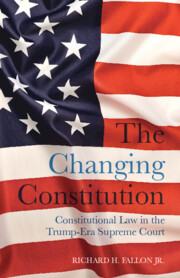Book contents
- The Changing Constitution
- The Changing Constitution
- Copyright page
- Dedication
- Contents
- Introduction
- 1 The Written Constitution and the Emergence of Judicial Supremacy
- 2 Historical Overview of Constitutional Adjudication by the Supreme Court
- 3 The Supreme Court Today
- 4 Freedom of Religion
- 5 The Freedom of Speech
- 6 The Expanding and Contested “Right to Keep and Bear Arms”
- 7 The Equal Protection of the Laws
- 8 Substantive Due Process and Unenumerated Fundamental Rights after the Overruling of Roe v. Wade
- 9 The Shrinking yet Still Formidable Powers of Congress
- 10 The Powers of the President and the Executive Branch in a Period of Ferment
- 11 Law and Change in the Supreme Court
- Index
Introduction
Published online by Cambridge University Press: 21 August 2025
- The Changing Constitution
- The Changing Constitution
- Copyright page
- Dedication
- Contents
- Introduction
- 1 The Written Constitution and the Emergence of Judicial Supremacy
- 2 Historical Overview of Constitutional Adjudication by the Supreme Court
- 3 The Supreme Court Today
- 4 Freedom of Religion
- 5 The Freedom of Speech
- 6 The Expanding and Contested “Right to Keep and Bear Arms”
- 7 The Equal Protection of the Laws
- 8 Substantive Due Process and Unenumerated Fundamental Rights after the Overruling of Roe v. Wade
- 9 The Shrinking yet Still Formidable Powers of Congress
- 10 The Powers of the President and the Executive Branch in a Period of Ferment
- 11 Law and Change in the Supreme Court
- Index
Summary
This chapter lays out the book’s central thesis that Supreme Court decisions changing previously prevailing interpretations of a mostly unaltered written Constitution represent the historical norm, not an exception. The chapter begins by discussing the death of Justice Antonin Scalia in February 2016 and the changes in constitutional doctrine that Scalia, who had pioneered the interpretive methodologies of originalism and textualism, had helped to bring about. The chapter also highlights changes that Scalia had urged but could not persuade a majority of his colleagues to adopt. It describes the political machinations by a Republican Senate majority in the aftermath of Scalia’s death and the similarly partisan maneuvers that resulted in the swift confirmation of a successor to the iconic liberal Justice Ruth Bader Ginsburg in 2020. Together, these developments helped produce the Court’s current supermajority of six conservative justices (out of nine), including three appointed by Donald Trump, and inaugurated a new era in constitutional history. After sketching this background, the chapter preliminarily sketches some of the book’s most important themes, including that the Supreme Court is a lawmaking institution but one that is constrained by widely shared understandings of the judicial role in ways that legislative lawmakers are not.
Keywords
Information
- Type
- Chapter
- Information
- The Changing ConstitutionConstitutional Law in the Trump-Era Supreme Court, pp. 1 - 17Publisher: Cambridge University PressPrint publication year: 2025
Accessibility standard: WCAG 2.0 A
Why this information is here
This section outlines the accessibility features of this content - including support for screen readers, full keyboard navigation and high-contrast display options. This may not be relevant for you.Accessibility Information
Content Navigation
Allows you to navigate directly to chapters, sections, or non‐text items through a linked table of contents, reducing the need for extensive scrolling.
Provides an interactive index, letting you go straight to where a term or subject appears in the text without manual searching.
Reading Order & Textual Equivalents
You will encounter all content (including footnotes, captions, etc.) in a clear, sequential flow, making it easier to follow with assistive tools like screen readers.
Structural and Technical Features
You gain clarity from ARIA (Accessible Rich Internet Applications) roles and attributes, as they help assistive technologies interpret how each part of the content functions.
